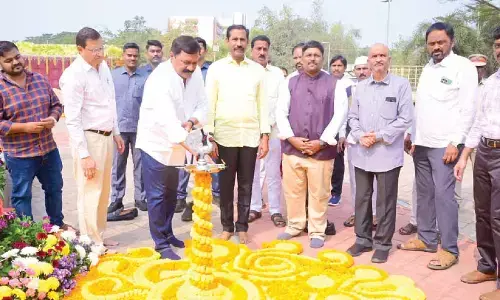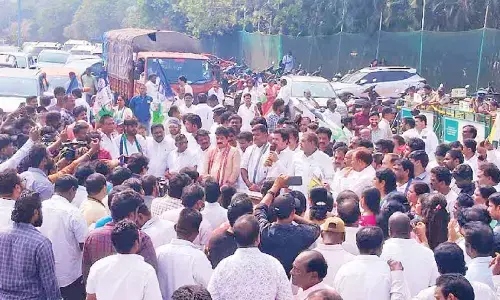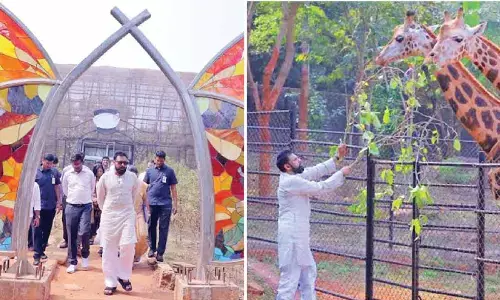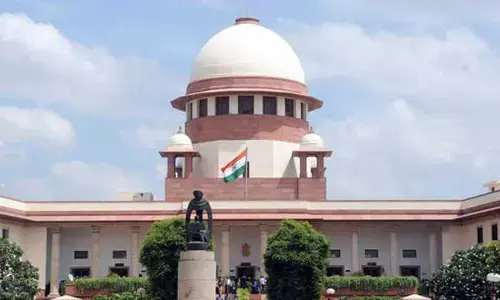MyVoice: Views of our readers 16th March 2025
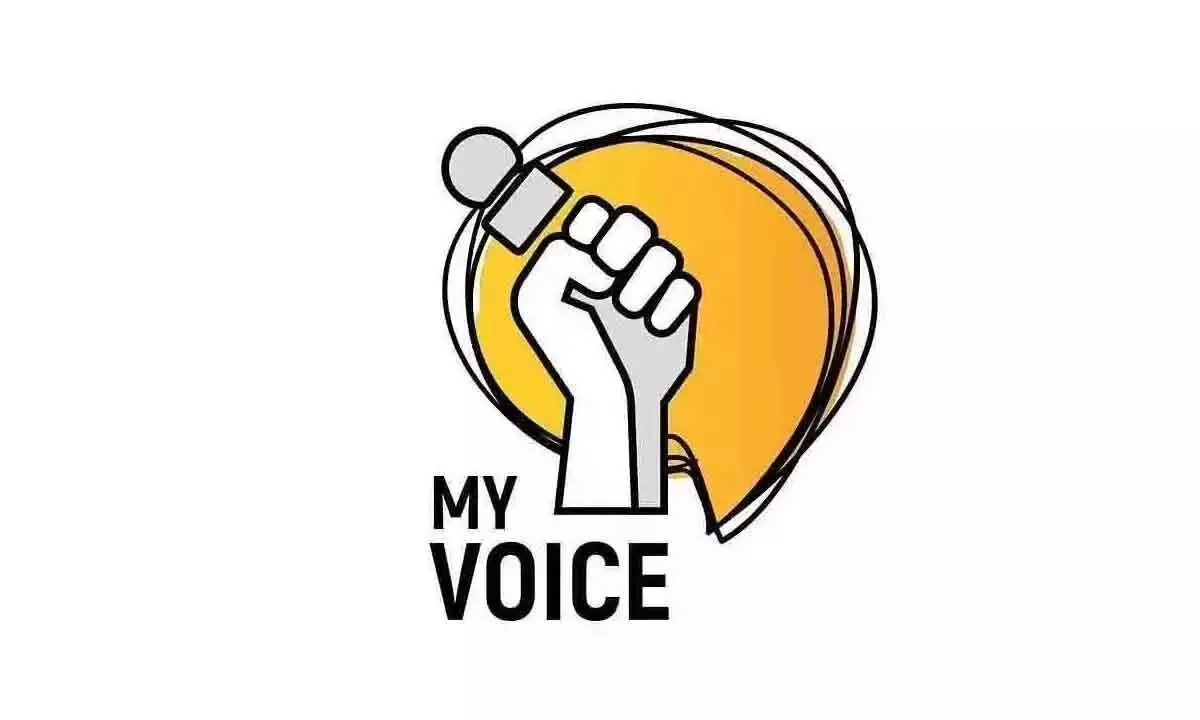
MyVoice: Views of our readers 19th January 2026
"Parochialism: When power comes first, not the nation" by V Ramu Sarma is an eye opener.
Time for Centre & States to learn to be accommodative
"Parochialism: When power comes first, not the nation" by V Ramu Sarma is an eye opener. But who listens to a reasonable patriotic appeal? The principle of high thinking and simple living seems to belong to a bygone era. However, as delimitation seems to be a problem a solution needs to be found democratically. No one can play one-upmanship. You are unique, no doubt, so is also the other one. Shouldn't we stand for unity in diversity, the very basis of our democracy?
–Dr J Bhagyalakshmi, Madanapalle
***
In response to TN CM's call to all CMs of South for a discussion on delimitation proposals of Union government, except Andhra Pradesh CM, all other heads of governments nodded their heads. The injustice felt by States is also applicable to AP also, but it has to maintain silence as TDP is a part of NDA. The rupee symbol controversy in addition to the New Education Policy is in contradiction to central policy, which are in fact not under the purview of State governments. Narrow-mindedness has been existing since Independence. What is the remedy? Solution is not in near sight.
–N Ramalakshmi, Secunderabad
***
The Tamil Nadu government’s decision to replace the ₹ symbol with a Tamil letter in the budget logo (March 14) raises an important question: how does this change affect the actual value of the rupee spent by the people of Tamil Nadu or across India? Such symbolic alterations do not address the real economic concerns facing the state or the nation. A far more pressing issue is the continuous depreciation of the Indian rupee against the US dollar. It is worth recalling that when Narendra Modi was Gujarat’s Chief Minister, he frequently highlighted the weakening rupee in his election rallies, even declaring that the “rupee is in the ICU.” Today, under his leadership as Prime Minister, the rupee’s value has continued to decline, raising concerns about economic management. Instead of focusing on such substantial issues, Tamil Nadu’s Chief Minister has engaged in controversies over language—first opposing the three-language formula, then resisting the National Education Policy (NEP), and now altering the currency symbol in a government logo. A more impactful approach would be to rally the state’s MPs to challenge the central government on economic matters that affect every citizen, rather than indulging in symbolic linguistic assertions.
– N Nagarajan, Hyderabad
***
Elected politicians always use their wisdom to impress upon others. Some Chief Ministers try to impose their views and policies only to benefit a few. Our country has the highest number of illiterates who cannot read nor write. All of them don’t understand what their leaders propose. Being constitutionally and legally elected, it is the responsibility of the leaders to discuss with all the political parties and their leaders and amicably convince them to support their proposals, failing which regional politics will be useful only to benefit the leaders of that region .
–G Murali Mohan Rao, Secunderabad
***
The delimitation exercise, which the government intends to do by 2026, will certainly affect the southern states in allocating an additional number of MP seats. At present we have 543 MP seats in the Lok Sabha, and this reallocation aims to reflect population changes and regional demographics more accurately. As a result, some southern states may gain representation while others may see a decrease, sparking debates about fairness and political influence across the country. may go up to 846 based on the population. The south will have only 165 seats with a nominal increase in MP seats. The states that are benefiting from delimitation will be UP, Bihar, Rajasthan, Maharashtra, and Bihar substantially. The southern state strictly followed the family planning that has been initiated by the central government instead of rewarding the southern states, and it will be disadvantageous to southern states if they do it as the population criteria. Also, the southern state will not have a say in the political system, and it will lead to south vs. north divide.
– Kanagiri SN Prasad, Hyderabad
***
Parochialism has been the ‘trademark’ for southern states these days - be it Tamil Nadu, Karnataka or Telangana, having their own way in governance to deliberately antagonise the Centre in the name of federalism for no reason at all. The three-language policy, as per which Hindi is the third language as part of three language policy in the National Education Policy announced by the Centre is okay with other states in the country, except Tamil Nadu - for no apparent reason. DMK’s allergy for Hindi has no rationale which is intended to help students learn more Indian languages to be comfortable in any part of the country. The delimitation seems to be another issue for Tamil Nadu and the prime concern of the state is the apprehension about losing Parliament seats, penalising the states that have successfully controlled the population growth despite the Centre unambiguously clearing those doubts.
–S Lakshmi, Hyderabad
***
Southern states are opposing delimitation plan based on population proportion and it needs to be postponed till an amicable concensus emerges. Every individual has pride in his own culture, language, festival and it is close to his heart and let us all learn to respect under federal structure of vibrant democracy. Election of CEC process devoid of free and fair elections, position of Deputy Speaker to opposition, states with bowl to Delhi for their legitimate funds, encouraging and manipulating interested industrialists, animosity to all neigbours due to faulty policy, PSU discouragement, imposition of languages and threats, imposed patriotism, Hinduism with Hindutva are all examples of hegemony and parochialism exhibited by the ruling party. This is causing prejudice and a crisis of faith among people. So, it is needed to bridge trust deficit with dialogue, not with monologue, for seamless governance.
–Buddha Jagdish Rao, Visakhapatnam
***
Every political party without exception is guilty of parochialism. All of them function on selfishness, pettiness and narrowness, which ‘parochialism’ is. Even the BJP-led NDA is guilty of vote-bank politics. If southern states do not see eye-to-eye with the centre over alleged ‘imposition of Hindi’ as perceived by them, and delimitation, these issues must be trashed out across the table, and commonality achieved. To label those states as ‘parochial’, just because they are opposition-ruled isn’t fair. Citizens are discerning enough to recognize and appreciate fairness in politics. Concerns of every state in this nation, irrespective of who rules her must be discussed at the national level and solutions found amicably.
–Dr. George Jacob, Kochi
***
After half a century, both centre and TN appear to be waging high-decibel politics on language issue on one side and then going ahead by linking it with delimitation issue as a political weapon to put the centre on the mat. This is nothing short of skulduggery because their only concern is to exploit power and make money. Knowing well that in a democracy, leaders derive their power from people and authority, unfortunately, instead of using them to serve them, blatant misusing them for their ulterior benefit becoming the norm is a sad reflection of affairs of governance. In short, such leaders have no place in a temple of democracy.
– K R Srinivasan, Secunderabad
***
The simmering tensions between the Union government and several southern states, particularly Tamil Nadu, over the implementation of the National Education Policy 2020 have brought to the fore critical questions about federalism, state autonomy, and equitable governance in India. The opposition and resistance to the NEP by Tamil Nadu and other southern states are not merely political but a defence of constitutional rights, educational integrity, and state autonomy. If the Union government continues to impose top-down policies without genuine consultation, it risks further alienating states and weakening the spirit of cooperative federalism. Another important grievance of southern states is the disproportionate allocation of funds. Tamil Nadu, Kerala, and Karnataka contribute substantially more to the national exchequer than they receive in return. This fiscal imbalance is aggravated by the Union government’s conditional approach to fund allocation, particularly tying financial support to the implementation of Centrally dictated policies like the NEP. However, the solution lies in fostering dialogue, respecting state diversity, and ensuring that education remains a shared responsibility rather than a tool for Central control. The stakes are high, and the path forward must be one of collaboration, not coercion.
– N Sadhasiva Reddy, Bengaluru
***
The writer clearly believes that only the politicians of the south are guilty of parochialism. It is wrong to believe that the Hindi heartland is the sole repository of Indianness. Their backwardness as compared to the south is due to their belief in their own superiority. Some of the statements made by political leaders from the south do not inspire much confidence in their ability to lead the nation. Parochialism is more entrenched in the north, but it is disguised as national identity. If India must move forward, the leadership should pass into the hands of the south. Though the south has a more glorious past in many ways, it does not obsess its past but is more forward looking and forward thinking than the north ever can be.
– Anthony Henriques, Mumbai
***
Before I write my views, I like to state that MG Ramachandran, the then Chief Minister of TN, got a wild thought that TN should be excluded from India and should be made as a separate nation in Indian continent. As everyone knows that scheme did not work. Symbol of rupee is a national policy, and none can change or alter it. TN CM called for a meeting to discuss on delimitation issue. What is the use of such missives when it is a central policy? Parochialism, regionalism, casteism, sectarianism, corruption and selfishness are the elements on top rank which hinders the growth of the nation towards a developed one at least by 2047.
–Dr N S R Murthy, Secunderabad
***
Every Indian state is unique in itself in terms of cultural and language diversity that our country alone can justifiably boast of, and these aspects are meant to enrich and unify the nation to make it stronger, without any divisive politics played out by the elected representatives. Sadly enough, such things are happening in the country in the name of NEP having a three-language formula; and in the delimitation exercise that is to take place in the country in 2026. Tamil Nadu’s hate for Hindi is assuming ludicrous proportions to the extent that even the Devanagari rupee symbol is erased and replaced with a Tamil letter in its logo for the budget 2025-26 for the state - an irrational and unjustifiable move that not only shows the DMK’s discomfiture with Hindi to be part of three language formula proposed in the NEP, but also indicative of wanton and deliberate disconnect with the Centre. Elbowing out Hindi, as a third option, is a bad decision by Tamil Nadu.
– K V Raghuram, Wayanad
***
The controversy between the Tamil Nadu state and the Central government is unwarranted. The DMK party and the BJP are in scuffle because of the Tamil Nadu government rejecting the National Education Policy, opposing the Centre's delimitation policy. It even came out with Tamil letter replacing the existing rupee symbol. On the other side, it is completely wrong on the part of Centre to give due shares of funds to Tamil Nadu, as the state refuses to accept the New Educational Policy. The funds are meant to carry out relief operations in flood-hit areas. The sufferers will be the poor people. This is not a new issue where Southern states accuse the Centre of trying to impose Hindi on Southern states.
– Zakir Hussain, Kazipet
***
There is a calculated design on part of the Opposition since the BJP led NDA came to power for the third time in the country. The southern states are consistently playing against the Centre, accusing it deviating from the professed path of federalism. by imposing the Centre's own agenda! The said states seem to have forgotten their responsibility in this regard to be inclusive in the interest of the country.
Tamil Nadu is in the forefront in this battle opposing Hindi being part of NEP in the country that other states have been practicing for a long time. The incorrigible Hindi phobia being enacted by the DMK on three language policy, strongly supported by the Chief Minister of CM M K Stalin, might seem to be cutting ice with his INDI partners, making him an instant hero for the southern states against the proposed delimitation of parliamentary constituencies, while other states have no such complaints. But, this would not pay any dividends to give any positive credit to INDI Alliance, except for playing a rebel role against the Centre for no valid or justifiable reason.
– K R Venkata Narasimhan, Madurai
***
Currency expert Anil Kumar Bhansali stated that it is wrong on TN's part since Rupee belongs to Govt of India and Reserve Bank of India and only they can decide on the change of its symbol, but a particular State cannot do it. Be that as it may, TN has a point to argue that governance can be taken into consideration against delimitation and surely the TN people are wise enough that they have been giving power almost every five years to the major Icons, DMK and AIDMK right from Periyar's movement are sceptical about Hindi thrust upon them. basically, the governments in all the Southeran States are secular and Center cannot afford to be manipulative to dismantle the very Constitution of India to suit their vested agenda and the very suspicion of it is the very core of the conflict.
– Dr T Ramadas, Visakhapatnam
***
The political slugfest began between the Centre and TN when the Modi led government at the Centre held up ₹ 2,162 crore to the state for not implementing PM SHREE scheme under the NEP. The CM felt it was nothing but black mailing the state which did fall in line with the BJP's agenda. It seems the issue once again opened the healed wounds of 1960's anti- Hindi agitation. In the case of delimitation issue, not only Stalin but also all CM of the southern states, except AP, echo delimitation was intended to punish the states which are proved themselves in population control and gifting in the form of increasing number of both Lok Sabha and Assembly seats to northern states which are miserably failed in controlling population. The Centre can advise the states which are lagging behind in population control to stablise the population on par with southern states by postponing delimitation exercise for some time.
–Pratapa Reddy Y,
Tiruvuru, NTR dt, AP
***
The allocation of Lok Sabha seats should not be based solely on population but also on development and social welfare indicators. The Rajya Sabha should be structured to ensure greater representation for the southern states, counterbalancing the loss of Lok Sabha seats. Additionally, special funds should be allocated to support the continued development of South India. Given that these states contribute significantly to national revenue, they must receive their fair share of financial resources. Before implementing delimitation in 2026, a comprehensive review should be conducted to ensure a balanced and just approach for all states. While delimitation is a constitutionally mandated process, it should not come at the cost of punishing states that have successfully implemented national policies on population control. Development-oriented states should not be politically weakened. The central government must reassess this decision and explore alternative solutions to maintain fairness and balance in representation.
–Srinivaas Goud Muddam, Hyderabad
***
The cries of Tamil Nadu over coercive imposition of Tri-language formula, negative impacts of delimitation and uneven redistribution of tax revenue carry meaning and immense sentiments. There is a general apprehension that if Hindi is allowed the local language would become extinct as it has happened so in the case of some languages. People of Tamil Nadu are against the efforts of the Union government to impose Hindi and many in the State are learning Hindi through Dakshin Bharath Hindi Prachar Sabha. People attaching more importance to their native language is an attitude that deserves appreciation. Moreover, Tamil is an ancient language with rich treasure of literatures and said to be older than Sanskrit. Therefore, people of Tamil Nadu being alert in carefully taking it down to future generations is neither a crime nor an unwanted act. It is the responsibility of the elected leaders to respect the sentiments of the people and for doing so calling them parochial is incorrect. It may also be remembered that when Door Darsan was airing News in Hindi it was news in Tamil in Tamil Nadu. Nothing untoward has happened by not listening to news in Hindi. The author asks what is going to happen if some seats are lost because of delimitation. It lacks rationality. Can a similar question be put before the BJP? What is going to happen if people of religion increase their population? The Union government seems to be wantonly bringing these divisive issues to cover up its visibly pro-rich policies and programmes, its failures in employment front and relieving the 81-crore poor from their growing livelihood issues.
–A G Rajmohan, Anantapur
Everyday Woman’s Day
women strive to make the world beautiful
a divine light which shines and
makes its way through all darkness;
with strength, hope, courage and determination;
Women inspire to be better and bold
We are mothers, daughters, sisters and friends
Who bring Joy and Love which never ends;
We work, we care, with selfless devotion
To make the World a better place
Women are forging ahead in all spheres
Give us any role and we march ahead ;
Fighting our way on the ladder to success
work-life balance is our voice today
Equal opportunities is what we want
And we want secure workplaces;
Our opinions to be heard and respected
Our goals achieved and our lives
to be filled with love, compassion and care;
let us celebrate International Women's Day
to celebrate the essence of being a woman
– Parimala G Tadas, Hyderabad
US turning intolerant of views critical of it
The statement of US Vice-President J D Vance about the status of Green Card hogged headlines all over for its controversial character. On the one hand, the USA champions the cause of freedom of speech/expression, but on the other, it is found to be misusing its discretionary powers against those individuals whose activities in general oppose its policies. The USA is said to be not frequently invoking its discretionary powers in cancelling the Green Card. This duality is seen not only in the US, but all over the world. As such it is no surprise that the new dispensation in Washington is adopting a harsher attitude towards its critics, even if this action is diagonally opposite to some of the basic principles. Mahmoud Khalil, a green card holder, participated in protest activity aligned with Hamas, the militant outfit of Palestine, that triggered the war between Israel and Hamas since October 7, 2023. The facts present themselves against Khalil, and that is fine. But why make a generalised comment that created controversy over the status of a Green Card? Perhaps Vance's intention is to warn future participants in anti-US activities. This controversy is not warranted at this juncture because the US is besieged by various issues and controversies ever since Trump was hoisted as the 47th President of USA.
–Govardhana Myneedu, Vijayawada








